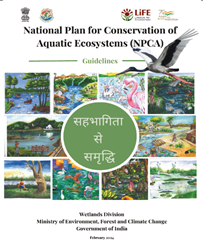New Delhi: The Ministry of Environment, Forest and Climate Change (MoEF&CC) celebrated the successful conclusion of the ‘Save Wetlands Campaign (SWC)’ on World Wetlands Day 2024, marking a significant achievement in the realm of conservation. Launched on World Wetlands Day 2023, the campaign adopted a comprehensive “whole of society” approach, engaging diverse stakeholders in wetlands conservation efforts at various levels of society.
Structured to align with the Mission Lifestyle for Environment (LiFE) and embracing the philosophy of Mission Sahbhagita, the SWC was implemented pan-India across all districts. The network of Ramsar Sites served as model sites, anchoring the campaign at the state and union territory levels. Active participation from State Wetland Authorities, District Administrations, Municipal Corporations, Gram Panchayats, Educational Institutes, and Knowledge Partners contributed to the campaign’s success.
Key achievements of the SWC include the organization of more than 6400 events throughout the year, ranging from wetland cleaning drives to painting competitions and sensitization workshops. These events engaged citizens, Wetland Mitras, and students across different states and union territories. Real-time monitoring was facilitated through a dedicated dashboard on the Wetlands of India portal.
A targeted social media campaign conducted over three months reached over 1 million citizens through Instagram, Twitter, and Facebook. The campaign aimed to raise awareness about the vital role wetlands play in daily life and emphasized the unique conservation values of Ramsar Sites across the country.
Encouraged by the commendable participation of all states and union territories, the Government of India has decided to continue the SWC activities, emphasizing the principle of ‘Conservation through participation and prosperity through conservation.’
The ‘Amrit Dharohar’ initiative played a crucial role in promoting the SWC, with collaborations involving the Ministry of Tourism (MoT), Central Institute of Educational Technology (CIET-NCERT), National Museum for Natural History (NMNH), and Eco-Clubs under the National Green Corps program. This holistic approach aimed to enhance nature tourism, develop digital educational content, engage school and college students, and raise mass awareness.
Under the Amrit Dharohar initiative, more than 600 People’s Biodiversity Registers (PBRs) around Ramsar Sites were updated, and floral and faunal inventories of 75 Ramsar Sites were developed by the Botanical Survey of India (BSI) and Zoological Survey of India (ZSI). The initiative also included training programs on nature tourism and wetlands livelihoods, with 196 local community members certified as nature guides.
In collaboration with CIET-NCERT, the MoEF&CC created educational videos focusing on different school levels, emphasizing the importance of wetlands conservation and management.
As part of Mission Sahbhagita, consultative workshops were organized with State/UT Wetlands Authorities, leading to the revision of the Guidelines for implementation of the National Plan for Conservation of Aquatic Ecosystems (NPCA). The revised guidelines introduce a Framework Management Plan, allowing states to seek funds for designing and implementing management plans, enhancing integrated management of wetlands.
India, bolstered by increased public awareness on wetlands management and conservation, has submitted nominations to the Ramsar Secretariat for the inclusion of three cities—Bhopal and Indore in Madhya Pradesh and Udaipur in Rajasthan—as Wetlands Cities under the voluntary Ramsar Wetland City Accreditation scheme for the first time. This move further reinforces India’s commitment to global wetlands conservation efforts.

